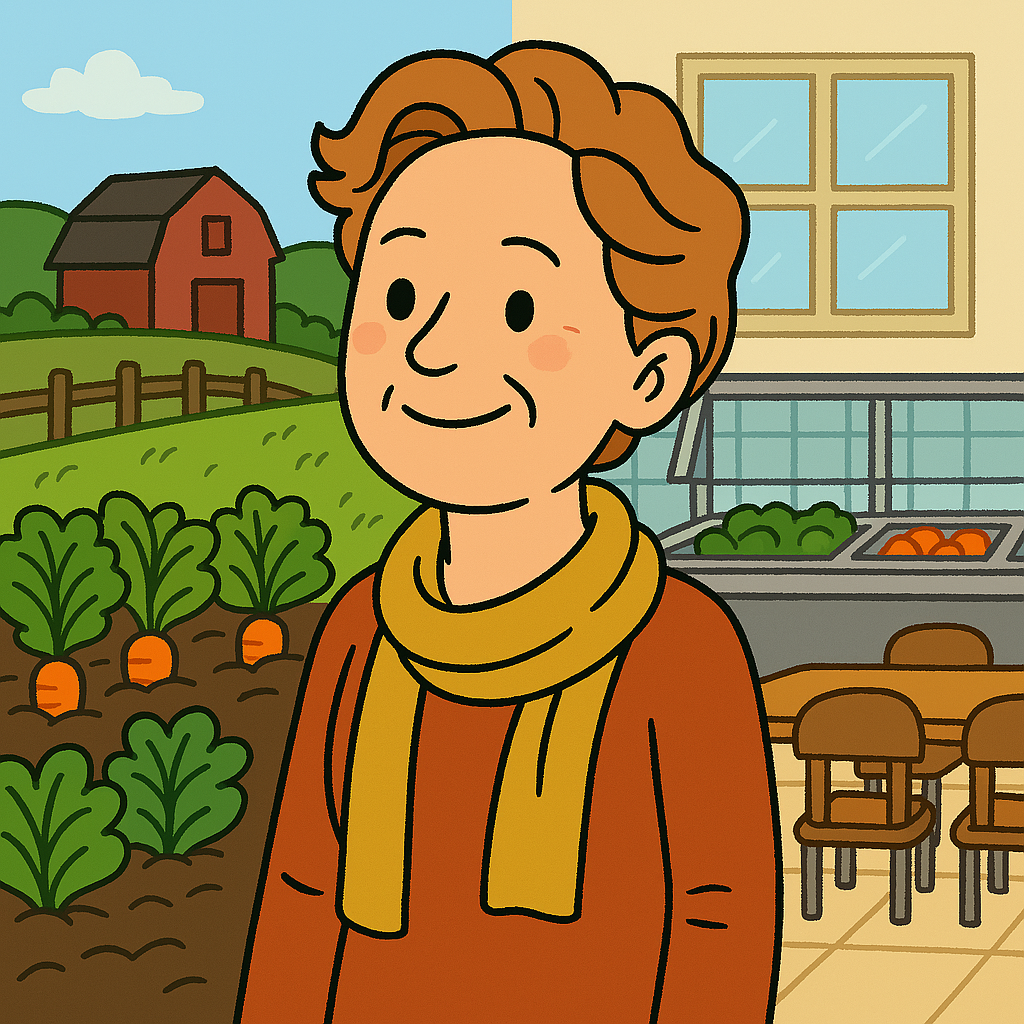
Alice Waters: Cultivating Change from the Ground Up
How a Chef Transformed School Lunches and Sparked a Movement
Alice Waters is far more than a world-renowned chef. She’s a visionary, a food activist, and a pioneer of the farm-to-table movement whose impact reaches far beyond restaurant kitchens. Through her work promoting sustainable agriculture, food education, and local sourcing, she has reshaped the way Americans—and increasingly, people around the world—think about food. At the heart of her legacy is the Edible Schoolyard Project, an initiative that has planted the seeds of lifelong change in the lives of children, families, and communities.
From the Kitchen to the Classroom
Alice Waters opened her now-iconic restaurant, Chez Panisse, in Berkeley, California in 1971. At the time, her philosophy was simple but revolutionary: cook with fresh, seasonal, locally grown ingredients—and treat food with respect. Her commitment to supporting small farmers and using organic produce wasn’t just about taste (though Chez Panisse became famous for its flavor). It was about forging a deeper connection between food, land, and community.
But Waters didn’t stop at the restaurant door. She began asking a powerful question: what if every child had access to healthy, freshly prepared meals—and learned where their food comes from? That question led to the creation of the Edible Schoolyard Project in 1995.
The Edible Schoolyard: Learning Through Food
At its core, the Edible Schoolyard Project is about integrating gardening, cooking, and shared meals into the school curriculum. The pilot program began at Martin Luther King Jr. Middle School in Berkeley, where an unused schoolyard was transformed into a vibrant garden and kitchen classroom. Here, students learn to grow food, prepare meals, and understand the relationship between health, the environment, and agriculture.
The results were immediate and profound. Children who had never touched a tomato were now harvesting, cooking, and tasting their way to better nutrition and a stronger connection to the natural world. By linking academic subjects to real-life experiences—science through soil testing, math through recipe measurements, and social studies through food cultures—the Edible Schoolyard created a holistic, hands-on learning environment.
Today, the project has expanded to a network of schools across the U.S. and internationally, inspiring educators and policymakers to rethink how food education fits into the bigger picture of child development, health equity, and environmental stewardship.
Championing Sustainability and Food Justice
Alice Waters’ work goes beyond school gardens. She has been a fierce advocate for sustainable agriculture, fair labor practices, and the transformation of public food systems. She believes that good food is a right, not a privilege—and that systemic change is possible when communities and governments invest in nourishing, ethical, and environmentally responsible food systems.
She has also been a vocal critic of processed, industrialized school lunches, arguing that children deserve better than reheated frozen meals. Her vision includes school kitchens that cook from scratch, menus that reflect local flavors and traditions, and funding that prioritizes nutrition and sustainability.
Through her activism, Waters has influenced national policies and inspired global conversations around food justice. Her work aligns with other movements tackling climate change, food insecurity, and public health—proving that food is not a standalone issue, but a powerful lever for broader change.
Planting Seeds for the Future
Alice Waters has received numerous accolades for her work, including the National Humanities Medal and the French Legion of Honor. But perhaps her greatest achievement is not a single award, but the quiet revolution she’s sparked—one garden, one classroom, one shared meal at a time.
As the climate crisis intensifies and diet-related illnesses continue to rise, her message is more relevant than ever: food is foundational. If we want to build a healthier, more equitable world, we must start with what we eat, how it’s grown, and who has access to it.
A Legacy of Hope and Nourishment
Alice Waters reminds us that real change doesn’t have to come from sweeping declarations or billion-dollar initiatives. Sometimes, it begins with a seed planted in a schoolyard, a child tasting a freshly picked strawberry, or a community coming together around a table.
By nurturing the connection between people and the land, Waters has given generations the tools to live more sustainably, eat more consciously, and act more compassionately. Her work isn’t just about food—it’s about growing a better world. 🌱🍎✨
Also in TuTu's Green Stuff Blog

Explore, Protect, Adventure: Discover the Magic of Mountains on International Mountain Day
Every year on December 11, people around the world celebrate International Mountain Day, a time to learn how mountains shape our planet and support life in incredible ways. Even if you do not live anywhere near a mountain, these towering natural wonders affect the water you drink, the animals you love, and the adventures you dream about.

World Soil Day, Discover the Amazing World Beneath Your Feet 🌍🪱
Soil might look like simple brown dirt, but it is one of the most alive and important parts of our planet. World Soil Day is a chance to explore the tiny world hidden beneath our feet, a world filled with creatures, nutrients, and natural systems that help plants grow, clean our water, and even protect the climate. When we understand how soil works, we can appreciate this incredible resource and learn how to protect it.

Every Species Matters: Learn, Share, and Help Animals Thrive on World Wildlife Conservation Day 🌍💚
World Wildlife Conservation Day takes place every year on December 4, and it reminds us how important it is to protect the amazing animals we share our planet with. Many species are endangered because of wildlife crime, which includes poaching, the illegal pet trade, and the destruction of habitats.
